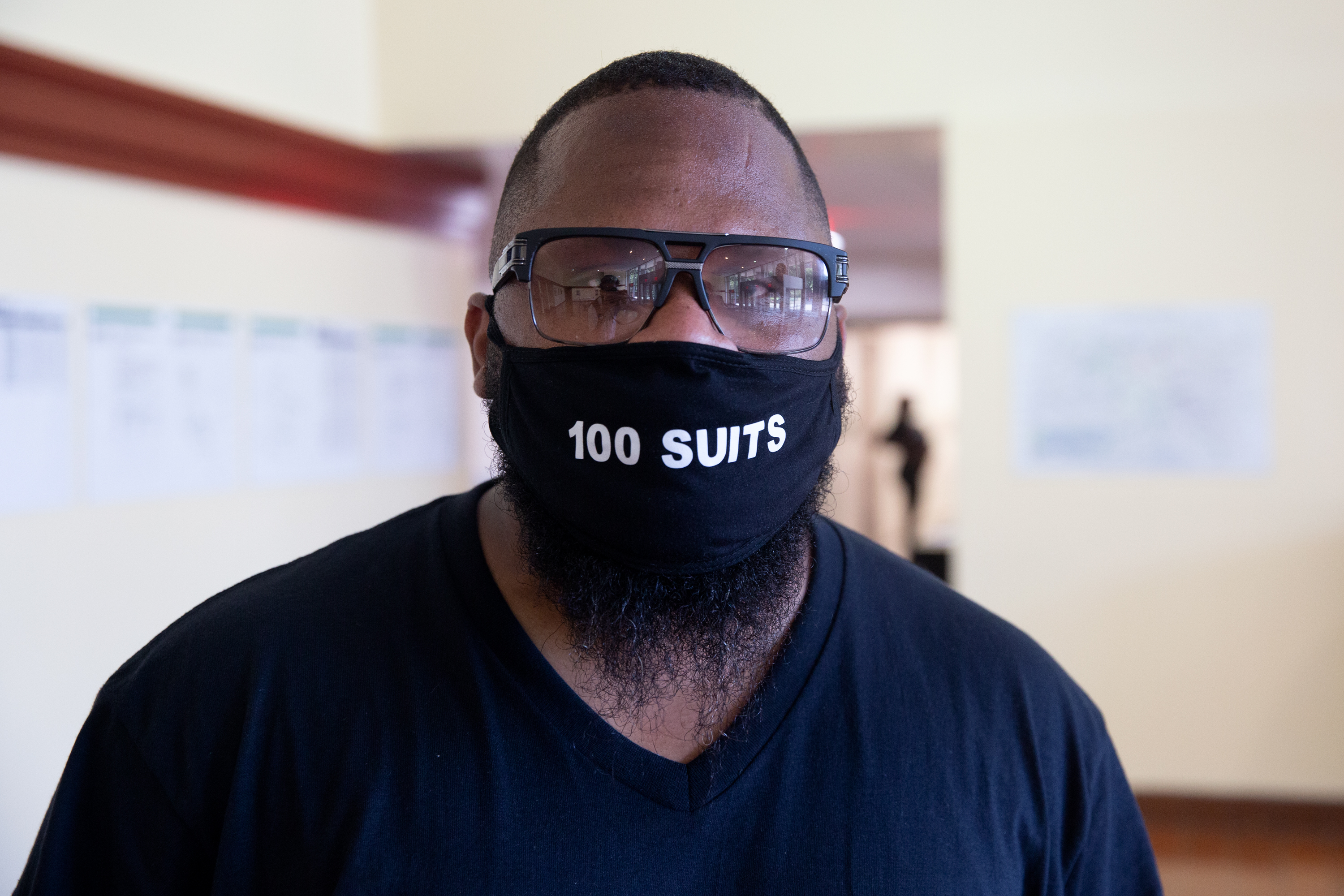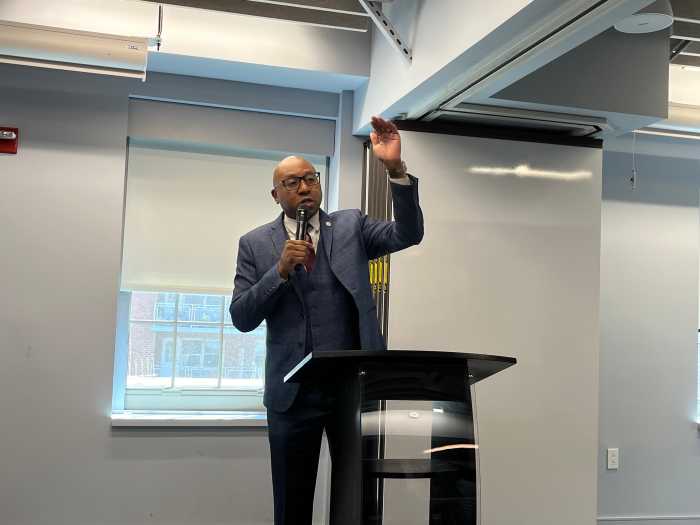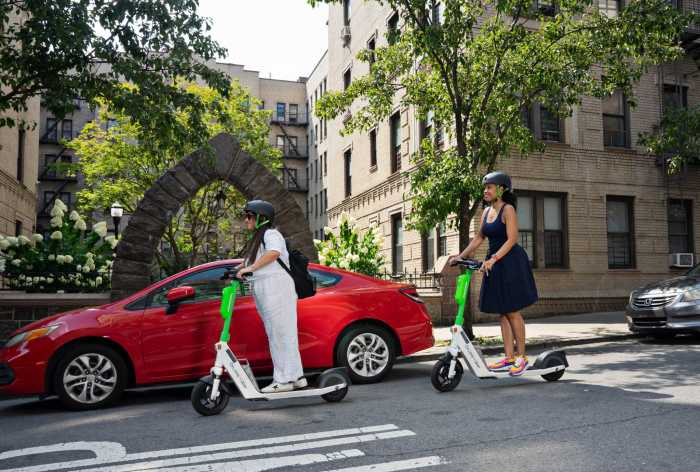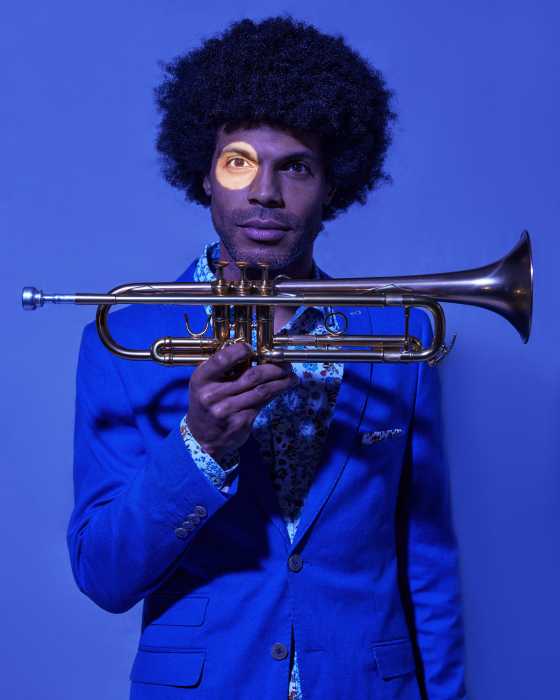BY CHRISTINE CHUNG, THE CITY

This article was originally published on by THE CITY
When a Black-run nonprofit raising funds to provide meals for senior citizens got the cold shoulder from a Korean-owned beauty supply chain with stores in Black neighborhoods across the city, the risk of a confrontation ran high.
Instead, in a deal celebrated Tuesday in Queens, Feel Beauty will be contributing $2,000 to 100 Suits for 100 Men, which got its start giving people in need business attire for job searches.
Feel Beauty’s owners also committed to filling open managerial positions from the local community and participating in quarterly meetings to discuss how better to support the handful of Black- and brown-owned beauty supply stores in Jamaica.
The union is “monumental,” declared Kevin Livingston, the founder of 100 Suits.
Charles Yoon, president of the Korean Association of Greater New York, also struck a note of long-term ambition: “This is not a one-time thing, but a commitment to work together on an ongoing basis.”
The agreement came in the face of a threatened boycott that area elected officials and business leaders were determined to avoid — echoing a clash three decades ago between a Korean-owned business and Black neighbors in Brooklyn.

And it speaks to local shoppers’ concerns that stores where they spend their money are owned by people who don’t come from their community.
Several customers shopping at one of three Feel Beauty locations on Jamaica Avenue told THE CITY they frequented the chain’s stores because of the convenience. Yet they wished more Black-owned beauty supply businesses operated in their neighborhoods.
“It does bother me, on a mild level,” said Kellee Nazaire, 42, of Jamaica. “It does make me think of why there aren’t more.”
Black dollars, Black community
Feel Beauty operates 20 stores in New York City, with most outlets located in Black communities, said Charles Park, the company’s owner. The stores carry an especially wide array of hair care products sought by Black women.
The shops’ ubiquity in Black neighborhoods made the company an obvious place for Livingston to seek charitable contributions, as he called numerous businesses looking for support.
But despite numerous attempts, he got no response at all from Feel Beauty. Livingston began to plan a boycott, “tired of the Black dollar leaving the Black community,” he said.
He added: “We want to make sure if you do business in this community, you must respect our community.”
Great meeting! 100Suits/ Feel Beauty supply chain !
Today I met with the Head of all of the operations at Feel beauty…
Posted by Kevin Element Livingston on Tuesday, July 7, 2020
Respect was one thing some customers of the chain’s stores felt was lacking. Online reviews for Feel Beauty outlets include numerous postings alleging racial profiling, including claims of being followed around the store for no reason.
Park did not respond to an inquiry about these allegations. Instead, he emphasized the partnership with 100 Suits as a long-term proposition.
“It is very important that we work together,” Park said, adding that roughly 70 percent of the company’s employees are Black. “That we contribute and that we return to the African-American community.”
The partnership that skirted a boycott was brokered with the help of Assembly members Ron Kim (D-Queens) and Alicia Hyndman (D-Queens), along with the Korean American Association of Greater New York.
“There was a situation that was moving up to a crisis, I think primarily because of a lack of communications channel,” said Yoon. “This is the kind of program that everybody needs to participate in to promote the welfare of the African-American community.”
Kim, who represents Flushing and Murray Hill, said that bringing both sides to the table made the de-escalation possible.
“Once the group thinking sets in, it’s hard to walk back,” Kim said. “I think this is definitely a start.”
Red Apple trauma
The resolution came in a stark contrast to a year-and-a half standoff that began in 1989 after allegations of racism at Red Apple, a Korean-owned grocery store in Flatbush, Brooklyn. A Haitian shopper looking to buy produce ended up leaving in an ambulance.
Accounts conflicted on what led to the altercation, and protests raged on until the Red Apple’s owner sold his business.
Following the boycott’s end, the Korean American Association of Greater New York helped form a delegation of 25 community leaders to visit Seoul. The purpose of the trip was “to prevent this from happening again and to deepen the understanding between Koreans and the Black community,” Byun Jong Duk, who was then the association’s president, said in Korean.
Byun said that the lessons learned — the importance of collaboration and cooperation — are lasting.
“The understanding is that we’re all working together, even now Koreans are doing business in Black neighborhoods,” Byun said.
Yoon said that in the decades that have elapsed since the Red Apple boycott, the former “lack of appreciation of the importance of community relations” has faded.
“It’s almost a different generation of immigrants, I would say,” Yoon said. “It’s really a different time than it was back then.”
Hyndman, who represents St. Albans, Jamaica and Laurelton, said that Feel Beauty’s commitments demonstrated that the “Asian community is stepping up.”
“I think it was important that in this space, in this time, we built a partnership with our business owners because why take money out of the community and take it back to your community, your community prospers and ours doesn’t?” Hyndman said.
“We don’t see any Black-owned businesses in mostly Asian-owned districts, but we see that in ours and it’s time we try to find a better balance, a better back-and-forth.”
THE CITY is an independent, nonprofit news outlet dedicated to hard-hitting reporting that serves the people of New York.



































